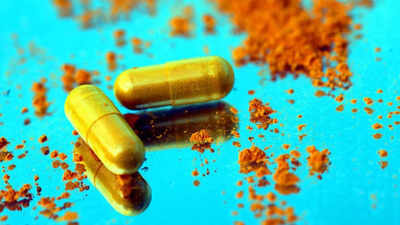ARTICLE AD BOX

Image credits: Getty Images
Turmeric, a spice derived from the roots of the plant Curcuma longa in India and Southern Asia, has a distinct taste. According to a 2020 study, the plant is associated with anti-inflammatory, anticancer, antidiabetic, antidiarrheal, antimicrobial, antiviral and antioxidant properties.Over the years, while people have incorporated turmeric in their diet through interesting and delicious recipes, those with a busy lifestyle have opted for turmeric supplements that contain up to 95% curcumin.According to studies, turmeric offers protection against kidney damage and dysfunction. It contains curcumin that is known to have antioxidant effects which neutralise harmful free radicals and protect cells from oxidative damage.In terms of liver disease, several studies suggest that it plays a role in treating non-alcoholic fatty liver disease by reducing inflammation, which is a key symptom. While you might be on the right track by taking turmeric supplements, knowing the right dosage, safety and restrictions is vital to avoid health problems. Below, find all you need to know about taking turmeric supplements for your health.
Ideal dosage of turmeric supplements

Image credits: Getty Images
According to the World Health Organization, 1.4 mg per round (0-3 mg per kilogram) of body weight is an acceptable intake.
However, according to studies doses of 500 to 2,000 mg of curcumin per day are well tolerated.Turmeric as a spice has low bioavailability when compared to supplements, thus, it is important to exercise caution while consuming it daily.
Safety risks associated with turmeric supplements

Image credits: Getty Images
While turmeric and its supplements are believed to be safe and beneficial for most individuals, for some it might be better to avoid them.Since turmeric supplements are high in oxalate, their excessive consumption can lead to the formation of kidney stones.
It can also lead to lower blood sugar levels and may interfere with iron absorption.Additionally, pregnant women must consult a medical expert before beginning to take these supplements, as there is not enough research to determine if they are safe for them.It is also known to interact with medications such as blood thinners, and diabetes medications.
Restrictions associated with turmeric supplements

Image credits: Getty Images
Turmeric supplements do come with some restrictions. According to a study published in JAMA Network Open in 2024, turmeric is one of the most common herbal ingredients linked to toxic hepatitis in the US.A New Jersey woman was even hospitalised for near liver failure after she was consuming 2,250 mg of turmeric supplements every day, increasing her liver enzymes 60 times the normal limit.The supplements can also increase your risk of kidney stones if it runs in your family history.



.png)
.png)
.png)
















 3 hours ago
3
3 hours ago
3









 English (US) ·
English (US) ·